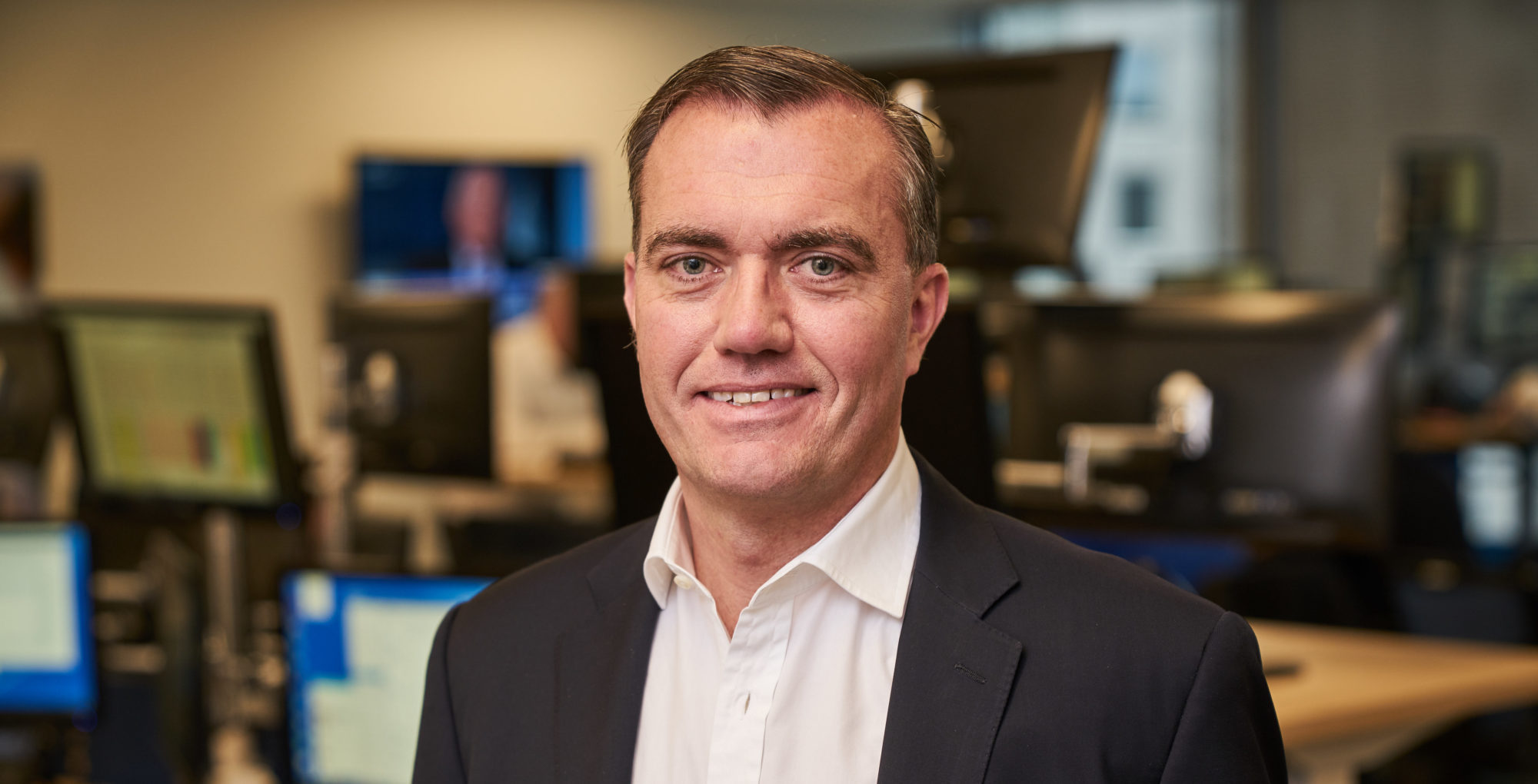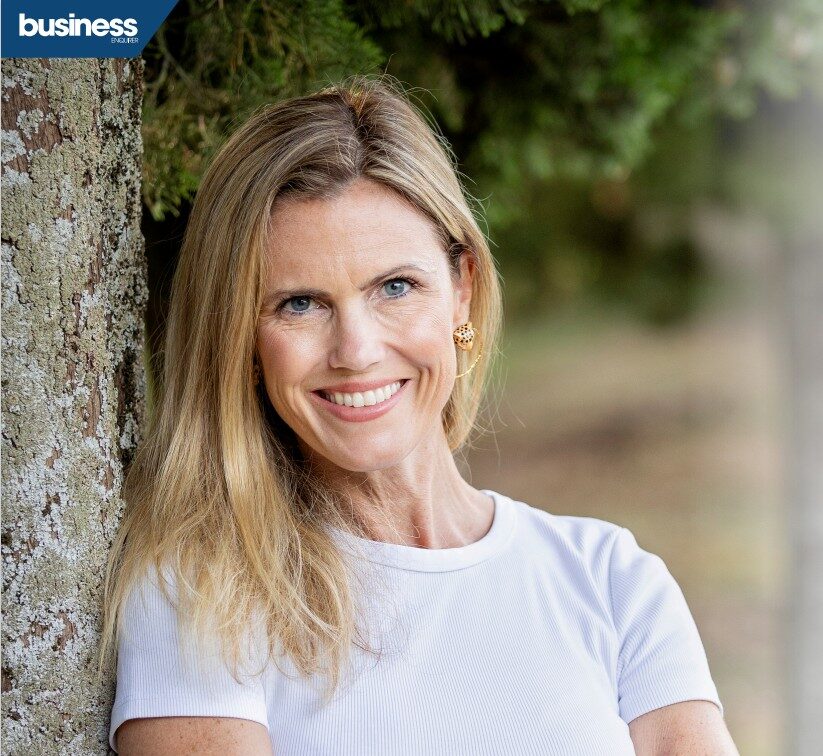Global Outlook: SCB founder Kevin McGeeney is keen to recruit talent from Ireland – In person: Kevin McGeeney, founder and CEO, SCB Group. (Published Jan 17th 2020)
You would be hard put to imagine a less likely eco warrior or indeed a less likely setting. Suited, booted and expensively turned out, Kevin McGeeney, the Irish CEO of Switzerland-based Starsupply Commodity Brokers, looks perfectly at home in the buzzy but old-world bar of Dublin’s Shelbourne Hotel. He also looks a lot more like a financier than he does an ecologist -but he’s adamant the two aren’t mutually exclusive.
As I catch up with him, McGeeney has packed an array of meetings into a short visit home. He joins me straight from one at a nearby private members’ club, and leaves on his way to an event at UCD. A day earlier, he’d spoken at the Institute of International and European Affairs (IIEA).
“I tend to book a trip like this around one central thing, which yesterday was the IIEA speech at Deloitte, but then I just pack it with all sorts of other things. It’s been a bit frenetic but very useful,” he says.
Despite decades living abroad, the Dubliner has the air of a man on home ground. He is a relatively infrequent visitor. UCD is his alma mater -he studied commerce -but also a hunting ground for recruits to his Swiss commodity trading business.
A guest lecture he’s giving to masters students on a course in environmental finance is an opportunity to talent scout for what remains a relatively niche sector.
“We’ve recruited nine people out of that course. It’s one of those 15 to 20-person courses and it’s been running for five years. So nine people in five years. We get on well.”
Recruitment is a recurring theme, reflecting strong growth at SCB, but also the challenge of finding or more often creating financial brokers with an environmentalist edge.
When McGeeney set up SCB with two business partners at the end of 2006, all three came from high finance. He had left the market at that stage, uncomfortable with the thrust of a global financial sector that it now turns out was on the brink of its own extinction event. He was lucky, leaving his then-employer ABN Amro before the crisis could destroy the value of share-based bonuses he’d accrued as a senior interest rate swap trader.
Having, as he saw it, left that world behind, and with time on his hands, he found himself drawn to environmental issues. “I started investigating environmental matters. It was at the time then of the ‘Inconvenient Truth’ (documentary) by Al Gore. So it was around a lot. There was a lot of rich data in the media to get one’s teeth into. I parked up at the library in London and I did an Open University degree course -just the study, I didn’t do the qualification, in renewable energy.” McGeeney admits he wasn’t an ecologically minded teenager at Dublin’s Blackrock College, later at UCD, or indeed particularly invested in the subject for much of his working life.
In hindsight, the 2002 collapse of the Larsen B ice shelf in Antarctica made an impression at the time, but there was, as he explains it, a delayed reaction.
Even then, taking the boy out of the bank didn’t take the banker out of the boy.
“I started learning about the mechanics of carbon and carbon reduction, and then realising that all my career in banking made me a markets person. There isn’t a problem that can’t be solved with a market solution,” he says, before joking that it’s a conviction that gives a hint of his own parenting style at home.
Fifteen years in investment banking -starting in London at a unit of Mitsubishi Bank followed by stints at Gen Re and ABN Amro in the US, Japan and London again -meant McGeeney was better placed to make an impact in financing the environment than re-engineering it.
He’d joined Mitsubishi Bank on a graduate scheme after the bank had sponsored postgraduate work he’d done at UCD.
“After the graduate rotation, I was put on an interest rate swap desk.”
The swaps trade is relatively complicated but fundamentally allows businesses to balance their need for foreign currencies with the desire to manage financial risks. In the run-up to the launch of the euro, as the risks between the soon-to-be euro members flattened out, the market exploded.
“Deutsche marks, guilders, lira. I think we did some of the largest ever Irish pound swap deals, if not the largest ever, in the six months before the creation of the euro. You saw huge scale across transactions of ten billion Irish pounds in the Irish market, which would never have seen that before.”
There’s a glint in his eye as he recalls the numbers, and he was clearly hooked.
By 2002, he’d moved to New York with Dutch bank ABN Amro as co-head of global interest options trading. It put him close to the heart of what would become the sub-prime mortgage crisis.
“We did a large amount of customer business with Fannie Mae, Freddie Mac … I ran the option side of the business and there was a contact, a fellow called Stephen Mulaney, who ran the swap side of the business. And as we saw what was developing in the mortgages, the two of us developed a desire to get as far away from it as possible.”
What alarmed them was the scale of the transactions being done for very little profit, on the assumption that nothing could happen to the mortgage markets.
“There was a Cassandra feeling about any complaints. So Stephen and I, we both shared the view that things that kind of go on forever stop eventually. This is going to stop. So I wanted to get far away from it.”
Initially, that meant physically far away, and he transferred to Tokyo with ABN AMRO, before leaving banking altogether.
He was lucky, he admits, that financially he emerged from the crisis in good shape – thanks to the timing of his exit.
In the post-banking era, he and two co-founders of SCB saw a green gap in the market.
“Renewable energy was something I wanted to do something about, but all I knew to do was how to manage markets,” he says.
Renewable energy was entering the mainstream, but green finance was way behind. That included the fact that unlike established commodities and fuels, there was little or no market infrastructure in 2006 to match buyers and sellers of renewables.
There’s no great need for that for wind and solar electricity – the dominant green energy in markets like the UK and Ireland – which travels through physical infrastructure.
On the other hand, biofuel was a renewable product in need of a market – and SCB set about creating a market to match buyers and sellers.
“It wasn’t something that anyone was doing so we were first to market with this by a long way. And probably way too early. But renewable fuels, liquid fuels, needed a marketplace.”
As a small team, the partners settled on Switzerland as a base, reflecting a mix of personal preference and practicality.
“The three of us picked a map of the world and we crossed off places we didn’t want to go, places we’d been before, places we had no interest in living in. And towards the end, Switzerland was one of the few places left. And then we picked the French speaking side of Switzerland, and established ourselves in a town called Nyon, which is still our headquarters.”
Location was helped by the fact that Geneva is already the commodity trading capital of the world, so the ultimate customer for the liquid fuel was going to be a distributor that may have a Swiss hub.
Back in 2006, biofuels were even more niche than they are now. Industry standards for the fuel, created from biomass including rapeseed, cane sugar and often waste cooking oil, were being drawn up in the US and Europe – and the process was often fraught as policymakers, traditional oil giants and green groups clashed over standards and definitions.
In the US, oil giants insisted that forecourt filling pumps had to declare whether fuel was bio or traditional – correctly betting it would turn wary customers off.
In Europe, McGeeney found himself surprised that NGOs, originally very pro-biofuel, turned against the products as they simplified anti-pollution messaging.
“So the whole thing was tremendously confused. And that confusion played out for the consumers. And depending on what media channel somebody went to, they could hear that renewable fuels could be our saviour or renewable fuels could kill us all.”
In contrast, a controversial company like Koch Industries in the US would quickly and efficiently adapt to the market.
However hit and miss, a market emerged and quickly expanded.
SCB sent its agents to events and conferences, finding producers, getting to understand their needs, and speeding up their access to customers in the traditional fuel distribution market who were well used to dealing with brokers.
“If there was a renewable energy conference, we went. And at that stage, there was a huge networking push.
“And we were just meeting hundreds and hundreds of people, and making thousands of phone calls.”
Producers had different challenges. For some, the supply of raw materials had a boost when European environmental laws came in, forbidding restaurants throwing away grease.
“What do you do with all that grease? Well, some folk turned it small scale, which became larger scale, into renewable diesel.”
But they still needed a market. Biofuel producers converting crops into energy had more complex supply chains, competing in the intersection of agricultural prices and energy prices.
“We came along as an outsourced sales agent. We were very warmly embraced.”
Growth came quickly, creating a potentially challenging need to hire. But the financial crisis meant bankers who had sniffed at the sector were keen for work.
“Extremely well-trained folk were leaving interest rate markets, FX markets, credit markets, bond markets. We had a lot of people applying and maybe willing to be a bit more broad-minded than they would have been two years before.”
By 2007, the partners knew they needed global scale, opening a second office in Chicago – like Geneva a major commodities trading hub.
Carbon reduction is now mainstream in industry, McGeeney reckons, impacting corporate strategic thinking, with managers now having to factor the potential risk of being on the wrong side of the financial fallout from failing to keep pace.
After getting in on the ground floor, he sees SCB entering more segments and making new markets, where technology needs financing to work effectively.
“Our mission is a low-carbon future and we would look wherever there’s a market solution. So as the technology changes, that’s the opportunity. If we get a market in bioplastics, we’ll move that way. We’ve started studying petrochemicals so that when there are biochemicals, we’ll help people make the switch.”
To Contact the reporter on this story:
Donal O’Donovan on Twitter: @donalodonovan



